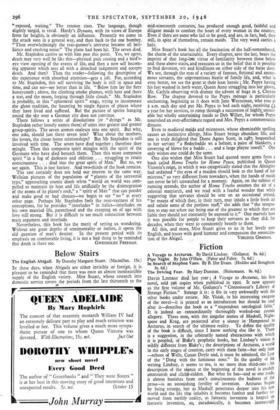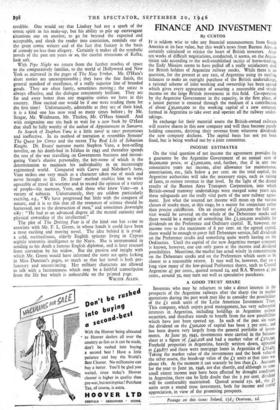Fiction
In Search of Stephen Vane. By B. Ifor Evans. (Hodder and Stoughton.
8s. 6d.) The Driving Fear. By Mary Dunstan. (Heinemann. 8s. 6d.)
DAVID LINDSAY died last year ; A Voyage to Arcturus, his first novel, sold 596 copies when published in 1920. It now appears as the first volume of Mr. Gollancz's " Connoisseur's Library of Strange Fiction." Strange it is : it fits in very awkwardly with the other books under review. Mr. Visiak, in his interesting exegesis of the novel—it is printed as an introduction but should be read after it—describes the book as a " stupendous ontological fable." It is indeed an --extraordinarily theroughly worked-out cosmic allegory. Three men, with the singular names of Maskull, Night- spore and Krag, are projected after a séance in Hampstead to Arcturus, in search of the ultimate reality. To define the quality of the book is difficult, since I know nothing else like it. There is a suggestion, in the arbitrarily named abstractions with which it is peopled, Of Blake's prophetic books, but Lindsay's vision is wildly different from Blake's ; the descriptions of Arcturus, a world in the early stages of creation, carry with them faint—but only faint —echoes of Wells, Conan Doyle and, it must be admitted, the Lear of the " Dong with the luminous nose." In the quality of his writing Lindsay, it seems to me, is no more than third-rate ' his description of the seance at the beginning of the novel is crudely amateurish and clich6-ridden. But what he has—and as one reads, it almost banishes from one's consciousness the badness of the prose—is an astonishing fertility of invention. Arcturus begins by being strange, but as Maskull penetrates deeper into his new world and the life that inhabits it becomes further and further re- moved from earthly reality, as fantastic invention is heaped on fantastic invention, so, paradoxically, it becomes increasinglY
credible. One would say that Lindsay had not a spark of the comic spirit in his make-up, but his ability to pile up extravagant situations one on another, to go far beyond the expected and acceptable, and shock the reader into conviction, reminds one of the great comic writers and of the fact that fantasy is the basis of comedy no less than allegory. Certainly it makes all the symbolic novels of the past ten years or so, the careful imitations of Kafka, look soft.
With Pipe Night we return from the further reaches of space to the comparatively familiar, to the world of Hollywood and New York as mirrored in the pages of The New Yorker. Mr. O'Hara's short stories are unexceptionable ; they have the fine finish, the general standard of excellence, of a really superior line of branded goods. They are often funny, sometimes moving ; the satire is always effective, and the dialogue consistently brilliant. They are far and away better than any magazine stories we have in this country. How excited one would be if one were reading them for the first time! Unfortunately, admirable as they are of their kind, it is a kind one has now read so many times before ; by Mr. Seagar, Mr. Weidmann, Mr. Thielen, Mr. O'Hara himself. And with resignation one sits back to wait for a new book by O'Hara that shall be fully worthy of the author of Appointment in Samarra.
In Search of Stephen Vane is a little novel at once pretentious and ineffective. In its method of-narration it resembles Symons' The Quest for Corvo and the recent The Real Life of Sebastian Knight. Dr. Evans' narrator meets Stephen Vane, a best-selling novelist, on his death-bed in Isfahan in 1943 and thereafter spends the rest of the war travelling on Government business and investi- gating Vane's elusive personality, the key-stone of which is the determination to maintain his individuality in an increasingly regimented world. Compared with Corvo and Nabokov's hero, Vane strikes one very much as a character taken out of stock and never brought to life. Dr. Evans' method enables him to write agreeably of travel in wartime and to record the opinion of a variety of people—his narrator, Vane, and those who knew Vane—on a variety of subjects. Unfortunately, they are seldom particularly exciting, e.g., " We have progressed but little with the conquest of nature, and it is to this that all the resources of science should be harnessed, not to the destruction of men," and sometimes downright gig : " He had to an advanced degree k the mental curiosity and physical cowardice of the intellectual." The plot of The Driving Fear is of the kind one has c(me to associate with Mr. F. L. Green, in whose hands it could haN e been a most exciting and moving novel. The idea behind it is good : a cold, rectitudinous, elderly English spinster living in Cyprus nightly transmits intelligence to the Nazis. She is instrumental in sending to his death a famous English diplomat, and is later rescued from starvation by his widow. But the passicn and insight with which Mr. Green would have informed the story are quite lacking in Miss Dunstan's pages, so much so that her novel is both per- functory and unconvincing. Her military characters are allowed to talk with a facetiousness which may be a faithful transcription from the life but which is unbearable on the printed page.
WALTER ALLEN.



























 Previous page
Previous page